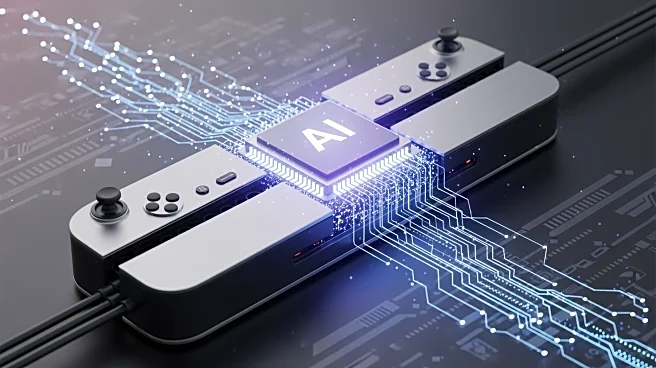What's Happening?
Two prominent figures in the video game industry, Hideo Kojima and Glen Schofield, have expressed their views on the role of artificial intelligence (AI) in game development. Kojima, known for his innovative approach, sees AI as a tool to boost efficiency
and assist in creative processes, while maintaining human leadership in creativity. He envisions AI handling tedious tasks to reduce costs and save time, fostering a co-creative environment. Schofield, co-creator of Dead Space and a veteran of Call of Duty, has been experimenting with generative AI for two years. He believes AI can address industry challenges by enhancing speed and efficiency without replacing human roles. Schofield also notes that historical technological advancements, like Photoshop and motion-capture, initially feared for job losses, ultimately created more opportunities. He anticipates a similar pattern with AI, despite potential short-term disruptions.
Why It's Important?
The integration of AI in the video game industry signifies a shift towards more efficient and cost-effective production processes. By embracing AI, developers can streamline operations, potentially leading to faster game releases and improved quality. This could benefit major gaming companies by reducing development time and costs, allowing them to allocate resources to innovation and expansion. However, the transition may pose challenges, such as job displacement, as AI tools replace certain roles. Despite this, the long-term impact is expected to be positive, with new job opportunities emerging in AI-related fields. The industry's adaptation to AI could set a precedent for other sectors, highlighting the importance of balancing technological advancement with workforce considerations.
What's Next?
As AI continues to evolve, game developers and companies may increasingly adopt AI tools to enhance their production capabilities. This could lead to a restructuring of roles within the industry, with a focus on AI management and integration. Companies might invest in training programs to equip employees with AI skills, ensuring a smooth transition. Additionally, the potential for an AI bubble, as suggested by Schofield, could result in market consolidation, with only the most robust AI systems surviving. This scenario mirrors the dot-com bubble, where surviving companies shaped the future of the internet. Stakeholders will need to monitor these developments closely to navigate the changing landscape effectively.
Beyond the Headlines
The ethical implications of AI in game development warrant consideration, particularly regarding job displacement and the creative autonomy of developers. As AI tools become more prevalent, the industry must address concerns about the potential loss of human creativity and the homogenization of game design. Furthermore, the reliance on AI raises questions about data privacy and security, as AI systems require vast amounts of data to function effectively. Developers and companies must ensure that AI integration respects user privacy and adheres to ethical standards. The cultural impact of AI-driven games, which may differ from traditionally developed games, could also influence consumer preferences and expectations.

















